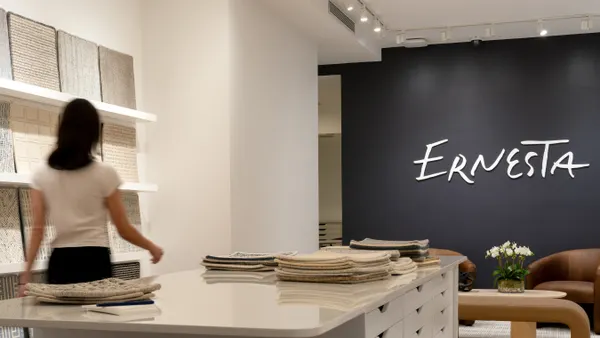Dive Brief:
-
Asos on Wednesday announced it is bringing swifter fulfillment options to London. "Asos Instant" provides a same-day delivery option for online orders placed before 10 a.m., Sunday through Friday, according to a company press release.
-
The service, which the fast-fashion retailer will expand to more cities in the U.K. in coming months, will cost £12.95 (about $17) and parcels will be delivered between 6-10 p.m. on the same day, the company said.
-
Asos already offers a variety of delivery options for online orders, including free next-day delivery for Asos Premier subscribers, (U.K. customers who pay y £9.95 or about $13 annually), pickup of online orders at more than 9,000 "Click and Collect" points around the U.K., a one-hour delivery window that allows customers to choose their delivery day and time, and free returns.
Dive Insight:
Asos is stepping up its delivery and fulfillment at a time when the brand and other fast-fashion rivals are speeding up their production and supply chain operations in a stiff challenge to mainstays Zara and H&M, which have been slow to e-commerce.
Many smaller apparel brands have sped up the design-to-sale process even more, turning fast fashion into
"ultra-fast fashion," according to a report earlier this year from research and consulting firm Fung Global Retail & Technology, "Fast Fashion Speeding Toward Ultrafast Fashion." Like Asos, Boohoo and Missguided can produce merchandise in two to four weeks, compared to five weeks for Zara and H&M and the six- to nine-month cycle for traditional retailers, according to the report.
Zara and H&M disrupted fashion by imitating styles from the runway and getting them onto store racks well before designers themselves made new collections available. It took a while, but even higher-end brands like Burberry, Tom Ford, Michael Kors, Thakoon Panichgul, Rebecca Minkoff and others have also drastically reduced the time they take to bring designs to market after fashion shows.
Those fashion brands have simply had to respond because fast-fashion retailers tend to sell knock-off versions for months before the real deal is available, Shelley E. Kohan, VP of retail consulting at store analytics firm RetailNext, told Retail Dive last year. Kohan notes that some luxury brands, in particular Burberry, are beloved by millennials, more of whom increasingly have the cash to afford them. But, with that age and extra cash will not come patience, with very few shaking their expectations of immediate availability.
"Customers want it now," she said. "There’s an emotional immediacy attached to that."
The even lower-priced retailers like Asos, which have strong (if not pure-play) e-commerce operations, are now challenging even the fast-fashion old-timers, according to Fung Global. Luxe brands and the fast-fashion companies until recently have largely eschewed e-commerce. British apparel retailer Primark doesn't sell online because the high costs interfere with its bottom-barrel prices. Luxury retailers, meanwhile, are behind in technology and have security concerns when it comes to shipping because of the high-dollar value of their goods. Plus, luxury customers expect their items to arrive in premium, carefully prepared packages. And when it comes to clothing, manufacturing cannot be rushed the way it is with lower-quality fast fashion.
"Ultrafast" fashion retailers, meanwhile, "avoid the historical retailer dilemma of product shortages versus excessive inventory, and ensuing markdowns and lower margins," according to Fung Global’s report. They
"operate agile supply chains to quickly match inventory supply with changing demand and strictly control inventory to create a balance between undersupply and markdowns. Initial designs are made in small batches to test demand, and, if successful, more items are quickly produced."













